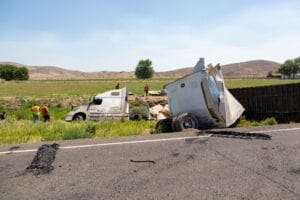A single commercial truck collision can cause significant harm to the average motorist, as it has the potential to involve multiple parties. Given the size and weight of most commercial carrier vehicles, an accident with one such vehicle has the power to change lives in fractions of a second. Recent federal data reveal a troubling trend that fatal crashes involving large trucks have increased dramatically. Most victims in these collisions occupy smaller vehicles, highlighting the critical differences between standard auto incidents and those involving commercial carriers.
Multiple factors elevate the stakes in these situations. Federal trucking regulations, corporate liability chains, and specialized insurance policies create layered challenges. Unlike typical auto claims, these scenarios often involve corporate defendants, black box data, and regulatory violations.
Victims face complex decisions when pursuing compensation. Things like analyzing driver logs, maintenance records, and cargo manifests are a must. This intricate process demands professional legal expertise in both transportation law and crash reconstruction.
Truck Accident Complexities
Truck collisions trigger legal challenges that extend far beyond typical roadway incidents. Unlike standard vehicle crashes, these events operate within a dense framework of federal oversight. The Federal Motor Carrier Safety Administration (FMCSA) enforces numerous safety rules affecting every aspect of trucking transport.
Operational standards encompass a range of measures, from driver certification processes to mandatory brake inspections. Companies must ensure their vehicles meet specific mechanical criteria before each trip. Even minor deviations from these protocols can indicate systemic failures during litigation.
Attorneys often use regulatory violations to establish negligence. Exceeding hourly driving limits or skipping pre-trip inspections directly violates FMCSA mandates. Evidence that there has been a breach of these policies often provides compelling proof of causation.
Drivers maintain critical records, like electronic logging devices (ELDs), to track service hours. Maintenance reports and cargo weight certificates also become pivotal. This documentation helps determine whether human error or corporate oversight caused the collision.
Navigating these cases demands expertise in both transportation law and investigative techniques. Your chosen legal team must interpret technical data while holding multiple parties accountable, from individual operators to multinational carriers.
Key Differences Between Truck and Car Accidents
Stopping distances reveal critical disparities. A loaded semi-truck requires significantly more road space to halt than passenger vehicles at highway speeds. This physics-driven reality leaves less margin for error in emergencies.
Height mismatches compound the danger. Many commercial trailers sit several feet above ground level, high enough for smaller cars to slide beneath during impacts. These underride collisions often shear off roofs and cause life-altering injuries.
Visibility challenges further separate truck-car incidents. Large rigs have blind spots spanning multiple lanes, particularly along their right side and directly behind trailers. Motorists lingering in these “no-zones” become invisible to drivers until collisions occur.
These physical contrasts demand specialized legal evaluation. Your trusted Attorney must interpret how weight distribution, braking capacity, and vehicle geometry contributed to damages, factors less significant in standard auto claims.
Why Truck Accident Cases Are More Complex Than Car Accidents
Determining fault in commercial vehicle collisions involves untangling responsibility across an entire operational chain. While standard auto incidents typically focus on driver actions, these scenarios require examining corporate practices, equipment safety, and federal compliance.
Transportation companies often face dual liability pathways. Vicarious liability holds them accountable for employee errors during work hours. Simultaneously, direct liability applies when failures in vehicle maintenance or driver training contribute to the occurrence of crashes. Maintenance providers and third-party inspectors may share responsibility if mechanical defects go unrepaired.
Cargo handlers add another layer of complexity. Improperly secured loads that exceed weight limits can destabilise trailers, creating preventable hazards. Manufacturers might also bear responsibility if defective parts, like faulty brakes or tire systems, cause or worsen collisions.
Federal Motor Carrier Safety Administration rules provide critical benchmarks for assessing negligence. Violations of service-hour limits or inspection protocols create tangible evidence of regulatory breaches. Attorneys frequently use these standards to build claims against multiple liable parties simultaneously.
This interconnected liability structure demands meticulous evidence collection. It is essential to reconstruct timelines using driver logs, repair records, and compliance reports. Thorough investigations often reveal how overlapping failures across different parties contributed to the incident.
Severe Injuries and Damages in Truck Accidents
Collisions involving commercial vehicles frequently result in severe injuries that create complex legal challenges. The immense weight and force of these crashes often lead to catastrophic harm unseen in standard auto incidents. Victims may face spinal cord injuries, traumatic brain damage, or internal organ trauma that requires extensive legal documentation.
Injured parties or their representatives must prove the full extent of injuries that often necessitate lifelong care. Paralysis and chronic pain cases require detailed medical testimony, with adaptive equipment costs creating substantial compensation claims. Traumatic brain injuries present particular challenges in establishing cognitive and emotional damages for legal proceedings.
Delayed-onset injuries complicate liability determinations. These conditions might not manifest symptoms until hours after impact, requiring attorneys to establish causation between the crash and subsequent medical complications. Emergency interventions become crucial evidence in building comprehensive damage claims.
Calculating damages becomes extraordinarily complex in these cases. Trusted legal professionals must quantify lost wages, rehabilitation expenses, and home modifications while building comprehensive economic loss claims. Attorneys often work with financial experts to project lifetime care costs and diminished earning capacity.
Proving non-economic damages like emotional distress and reduced quality of life requires sophisticated legal strategies. Legal professionals specializing in truck collision cases must navigate intricate insurance policies, establish liability across multiple parties, and build evidence-based claims that account for both immediate and long-term consequences.
Role of Evidence in Truck Accident Litigation
Building a strong legal claim in truck accident litigation hinges on specialized evidence collection. Different from standard auto incidents, these cases demand thorough documentation of mechanical conditions, operator behavior, and corporate compliance. Critical proof sources include electronic logging devices (ELDs) capturing real-time vehicle data and driver activity.
Maintenance records prove vital in revealing overlooked repairs or defective parts. Driver logs mandated by FMCSA rules expose potential hours-of-service violations. Cargo manifests can demonstrate improper loading practices affecting vehicle stability.
Preserving this evidence requires immediate action. Trucking companies often reset ELD systems automatically, erasing crash-related data. It is frequently necessary to send anti-spoliation letters to defendants in order to prevent evidence destruction or to hold them accountable when they have intentionally or negligently failed to do so.
Understanding these evidentiary requirements in truck accident cases helps victims build compelling claims supported by industry-specific documentation. Proper handling of technical proof strengthens negotiations and courtroom arguments alike.
At Sexton Weldon Law Firm, we understand the nuances of truck accident litigation. From investigating logbook violations and maintenance failures to identifying negligent carriers, we build strong, evidence-based cases in order to obtain the compensation each client deserves. Our firm is equipped to hold trucking companies and their insurers accountable while protecting the rights of injured individuals every step of the way.




